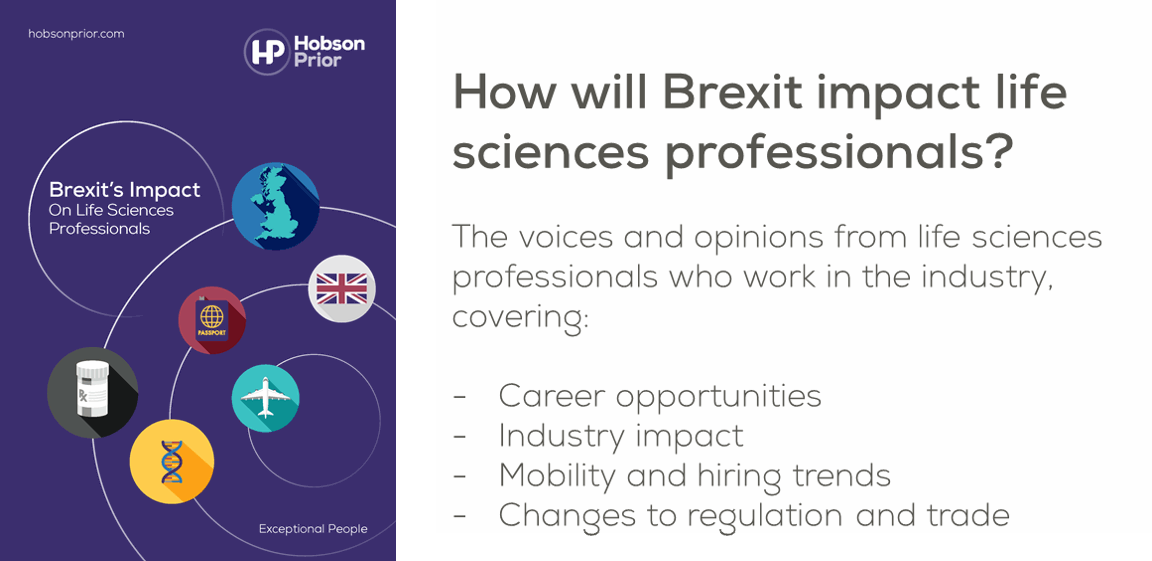How Brexit is impacting the life sciences industry



Brexit’s impact on the life sciences industry
The UK accounts for around 25% of the EU market so will remain a key contributor to the European life sciences market, however, Brexit will undoubtedly lead to some changes, most notably with the European Medicines Agency relocating from London to Amsterdam.
If the UK remains part of the European Economic Area (EEA), it would continue to trade with the EU with minimal impact to border checks. A hard Brexit will lead to more significant changes as the UK and EU will need to negotiate on the terms of their relationship and how this will impact regulation, the free movement of workers and the trade of medicines and medical devices.
Although the UK would be the first country to leave the EU, it is not the only European country that operates outside of the EU. Countries like Norway, Iceland and the life sciences powerhouse Switzerland are not members of the EU and have formed agreements with EU nations through the EEA, EMA and EFTA.
The largest impact to the life sciences industry would occur if the UK were to leave the EU without an agreed deal.
Most life sciences companies are making sure they have a “No Deal” back up plan to ensure they can continue the supply and distribution of medicines and medical devices to patients across Europe.
Key areas that may be impacted most include:
- Career opportunities and hiring
- Trade and distribution
- Regulation and the EMA relocation
- Clinical trials and funding
Career opportunities and hiring
There are mixed signals regarding the effect of Brexit on career opportunities. Some large life sciences company headquarters are moving from the UK to the EU and some positions require workers to be based in a specific country. For example, the Qualified Person Responsible for Pharmacovigilance (QPPV) for the EU regulations needs to be based in the EU, meaning a UK-based EU-QPPV would need to relocate or be replaced.
“Brexit has been a double-edged sword for career opportunities. The greater administration and duplication for EU and UK equivalents has created more jobs in the build-up of Brexit. However, it has also forced many to question relocation and their job security.”
Callum Mansfield, Associate Director at Hobson Prior
Both the EU and UK have agreed to safeguard the rights of EU citizens living in the UK and UK citizens living in the EU. EU citizens and their families that have lived in the UK for at least five years before the end of the transition period will be able to apply for “settled status”, which will give them the right to remain and work in their country of residence indefinitely. This has been replicated for UK citizens living in the EU. Whilst this has been a reassurance to many life science professionals living across Europe, there are concerns this will reduce the appeal of working internationally.
Trade and distribution
The EU operates as a single market keeping trade across the EU open.
If the UK remains part of the EEA, it will maintain most of the existing system, minimising the impact of Brexit. If the UK does not join the EEA, it will need to negotiate sector-specific trade agreements with the EU’s single market.
“Patient access to medicines and medical devices is a key concern. Some life sciences companies have stockpiled these products to avoid supply issues from potential customs and border checks.”
Calum Watson, recruitment manager at Hobson Prior
Regulation and the EMA relocation
Regulations on quality assurance and the process of obtaining marketing authorisation depend heavily on the relationship the UK maintains with the EEA. The UK will still be able to apply for authorisation in the EU, in the same way as non-European countries. This process may lead to additional checks and costs.
The European Medicines Agency (EMA) is currently based in London, UK, but it is anticipated to relocate to the EU. As part of the EEA, the UK could still apply for market authorisation through a centralised route. If the UK leaves the EEA, they will need to produce multiple national applications, depending on the deal that is agreed with the EU.
“The EMA relocation has already required workers to either move to Amsterdam or find alternative employment. Much is still to be decided in terms of medicines and medical devices regulations.
Although the EMA and MHRA are continuing to collaborate over the transition period, we’ve already seen the EMA award the MHRA fewer contracts during this uncertain time.”
Raymond Pankhurst, regulatory affairs recruiter at Hobson Prior
Clinical trials and funding
On leaving the EU, UK pharmaceutical companies would no longer have automatic access to funding from EU research and innovation schemes. The UK may be able to negotiate their inclusion and access to these schemes as an associated country, but this would likely require the UK to provide a financial contribution.
Currently, the UK is one of the most popular locations for phase I, phase II and phase III trials. Member states may prefer to run trials within the EU to give them access to a larger market.
“Where the UK is no longer being part of the EU regulatory system, it may be more costly to run separate trials for the UK. This will likely impact the UK’s appeal for clinical trials.”
David Chipp, associate director at Hobson Prior
Voices from the industry
To better understand how the industry is preparing for Brexit, we wanted to hear the views from those who work across the life sciences industry. We asked 1,281 candidates and clients to take part in our survey to collect a better understanding of how the attitudes, values and future plans will potentially be impacted for people in our industry.
We are happy to announce the release of “Brexit’s Impact on life sciences professionals” by Hobson Prior. Focusing on career opportunities and industry impact, this report is an overview of the opinions and voices of those working within the industry and how they anticipate Brexit to affect their jobs, mobility and opportunities.
Unsure how Brexit will impact hiring trends in life sciences?
As a leading life sciences recruitment consultancy, Hobson Prior is committed to connecting the best candidates to the projects and jobs that need them. Our unique and focused approach has enabled us to develop long-term, trust-based relationships with our candidates and clients.
If you’d like to discuss the report, your company’s staffing requirements or your personal career opportunities with us, please do not hesitate to get in touch with our recruitment experts.






+(395+x+285+px).png)

+(395+x+285+px)+(1).png)
.png)



.png)


